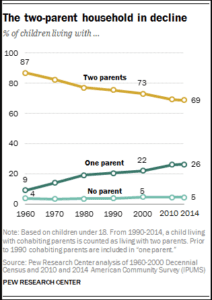Co-Parenting Tips for Setting Hurt & Anger Aside
Nearly half of all American children will see their parents get divorced and 16% of American children will live in a household with a step-parent, step-sibling, or half-sibling. With 50% of children having divorced parents, co-parenting is more commonplace than ever in the United States. Co-parenting is defined as sharing the duties of raising a child (used especially of parents who are separated or not in a relationship). But what happens when one or both parents are emotionally hurt or angry? How do these dynamics impact their child? We have some ideas. Read on for co-parenting tips for setting hurt and anger aside.

Since 1960, the percentage of children in the United States living in a two-parent household continues to decline.
Successful Co-Parenting Means Keeping the Focus on Your Child
The key to successful co-parenting is to focus on your children—and your children only. Yes, this can be hard. It means that your own emotions— anger, resentment, or hurt—must take a back seat to the needs of your children.
Admittedly, setting aside such strong feelings may be the most challenging part of learning to work cooperatively with an estranged partner, but it is also perhaps the most vital. Co-parenting is not about your feelings or those of your other co-parent, but rather about your child’s happiness, stability, and future well-being.
You may never completely lose all your resentment or bitterness about your breakup, but what you can do is often remind yourself that they are your issues, not your child’s. Try hard to keep your relationship problems away from your children. Whether you got divorced from a former spouse or broke up with a long-term partner, it is okay to be hurt and angry. However, your feelings do not have to dictate your behavior with your children. Instead, let what is best for your kids dictate your co-parenting style. Remember, your children are the most precious and lasting product of your union as a couple. Allowing them to develop a healthy relationship with both of you is a gift you can give, even in the face of a divorce or a breakup.

Dr. Joel N. Myers (pictured here) founded the Dads Resource Center to benefit children of separated or divorced parents by advocating the importance of fathers having adequate opportunities to fulfill their role of fatherhood.
Co-Parenting Tips for Setting Hurt & Anger Aside
The goal of co-parenting is to work cooperatively with your ex. Here are some of our best co-parenting tips for success, especially if you are feeling hurt by or angry at your ex.
Co-Parenting Tip #1: Get your feelings out somewhere else
Never vent your angry feelings about the other parent to your child. Friends, counselors and therapists, family, or even a loving pet can all make good listeners when you need to get negative feelings off your chest.
Co-Parenting Tip #2: Stay kid-focused
If you feel angry or resentful, remember why you need to act with purpose and grace: your child’s best interests are at stake. If your anger feels overwhelming, consciously putting your shoulders down, breathing evenly and deeply, and standing erect can keep you distracted from your anger, and can have a relaxing effect.
Co-Parenting Tip #3: Never use your child as a messenger
When you have your child become the “go-between” with the other parent it puts them in the center of your conflict and gives them a parent-like role. The goal is to keep your child out of your parenting, so call, email, or text your ex yourself.
Co-Parenting Tip #4: Try to listen
Communicating with maturity starts with listening. Even if you end up disagreeing with the other parent, you should at least be able to convey to each other that you have understood thier point of view. Listening does not signify approval, so you will not lose anything by allowing your ex to voice their opinions.
Co-Parenting Tip #5: Keep your intimate marital issues to yourself
Do not say negative things about your ex to your children or make your child feel like they must choose. Your child has a right to a relationship with their other parent that is free of your influence. Before contacting your ex, ask yourself how your talk will affect your child, and resolve to conduct yourself with dignity. Make your child the focal point of every discussion you have with your ex-partner.
About the Author
Hope Nichols, LMFT is a Philadelphia and Wynnewood, PA, therapist accepting new patients. Click here to book an appointment.
If you are divorced or separated from your child’s other parent and have questions about the best co-parenting tips, you may reach Hope at hnichols@councilforrelationships.org or 215-770-2334 ext 7061.
See our Therapist & Psychologist Directory to find a different CFR therapist or psychiatrist near you.
About CFR’s Couples and Family Therapy
Council for Relationships has been offering therapy and psychiatry services to individuals, couples, and families since 1932. If you are interested in individual, couples, or family therapy, request an appointment today. With over 80 therapists, psychologists, and psychiatrists seeing clients virtually or at the 9 CFR locations across the Philadelphia region, there is sure to be a clinician for you and your family. CFR also offers therapy at no-fee or low-fee for those who are facing financial hardships. Head here to learn more and to request an appointment.

